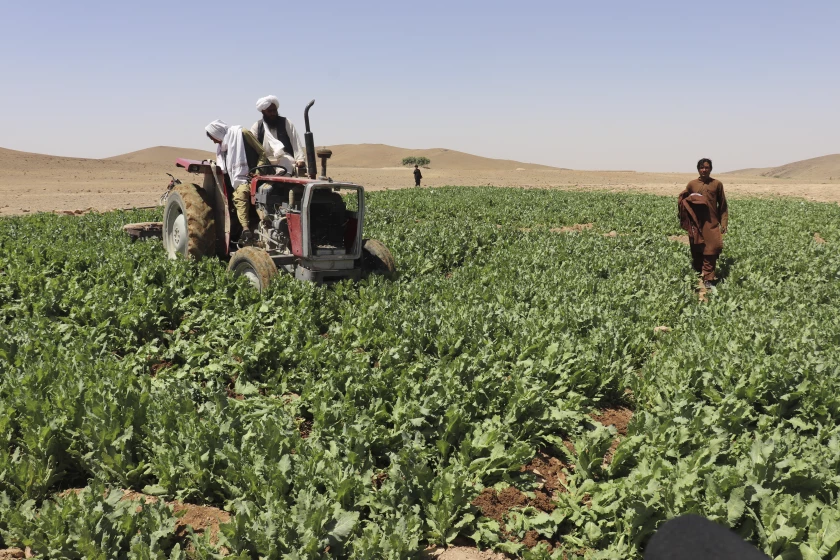The Taliban have launched a campaign to eradicate poppy cultivation in Afghanistan in an effort to stamp out the country’s massive opium and heroin production, as farmers fear their livelihoods will be ruined at a time of growing poverty.
Armed Taliban fighters recently stood guard as a tractor uprooted a poppy field in Washir district, southern Helmand province. The owner of the land watched the operation from close by.
The Taliban, who took power more than nine months ago, issued an edict in early April banning poppy cultivation throughout the country. Those who violate the measure “will be arrested and tried according to sharia law in the relevant courts,” Deputy Interior Minister for Narcotics Mullah Abdul Haq Akhund told The Associated Press in Lashkar Gah, the capital of Helmand.
Afghanistan is the world’s largest opium producer and a major source of heroin in Europe and Asia. Production has skyrocketed in the last 20 years despite billions of dollars spent by the United States to curb cultivation.
But the ban could be a major setback for the millions of impoverished farmers and day laborers who depend on the income they earn from this crop to survive. The veto comes at a time when the country’s economy has collapsed and is short of international funding after the Taliban takeover. Most of the population is struggling to buy food and the nation is suffering its worst drought in decades.
Noor Mohammed, owner of one of the poppy fields destroyed by Taliban tractors in Washir, said his plot is small and has no water, so he cannot survive on less profitable crops.
“If we are not allowed to grow this, we will not gain anything,” he said of his plants.
Day laborers can earn more than $300 a month harvesting opium from poppies. Villagers often use the promise of the next harvest to borrow money to buy basic goods such as flour, sugar, and cooking and heating oil.
Helmand is the heart of poppy production in the country. It appears that the new eradication campaign is mainly targeting those who planted the poppies after the ban was announced. Many others who had planted them before were already able to harvest: a manual labor, plant by plant, in which the bulb is cut to extract the sap, which is the raw material from which opium is extracted.
Akhund, the deputy interior minister, said the Taliban is in contact with other governments and NGOs to find alternative crops for farmers.
I don’t know how many fields have been planted this year, how many have been harvested and how many have been uprooted by the Taliban so far.
But Afghan production has risen steadily, reaching new heights in recent years. In 2021, 177,000 hectares (438,000 acres) of poppies were planted, from which enough opium was extracted to produce up to 650 tons of heroin, according to estimates by the United Nations Office on Drugs and Crime (UNODC). in English). This was an increase from up to 590 tons of heroin in 2020.
The total value of Afghan opium production in 2021 was between 1.8 and 2.7 billion dollars, almost 14% of the country’s GDP, exceeding the value of its legal exports, the UNODC said in a recent report.
During its first government in the late 1990s, the Taliban also banned these crops and, thanks to a fierce campaign to destroy the plantations, production was almost completely eradicated in two years, the UN said.

